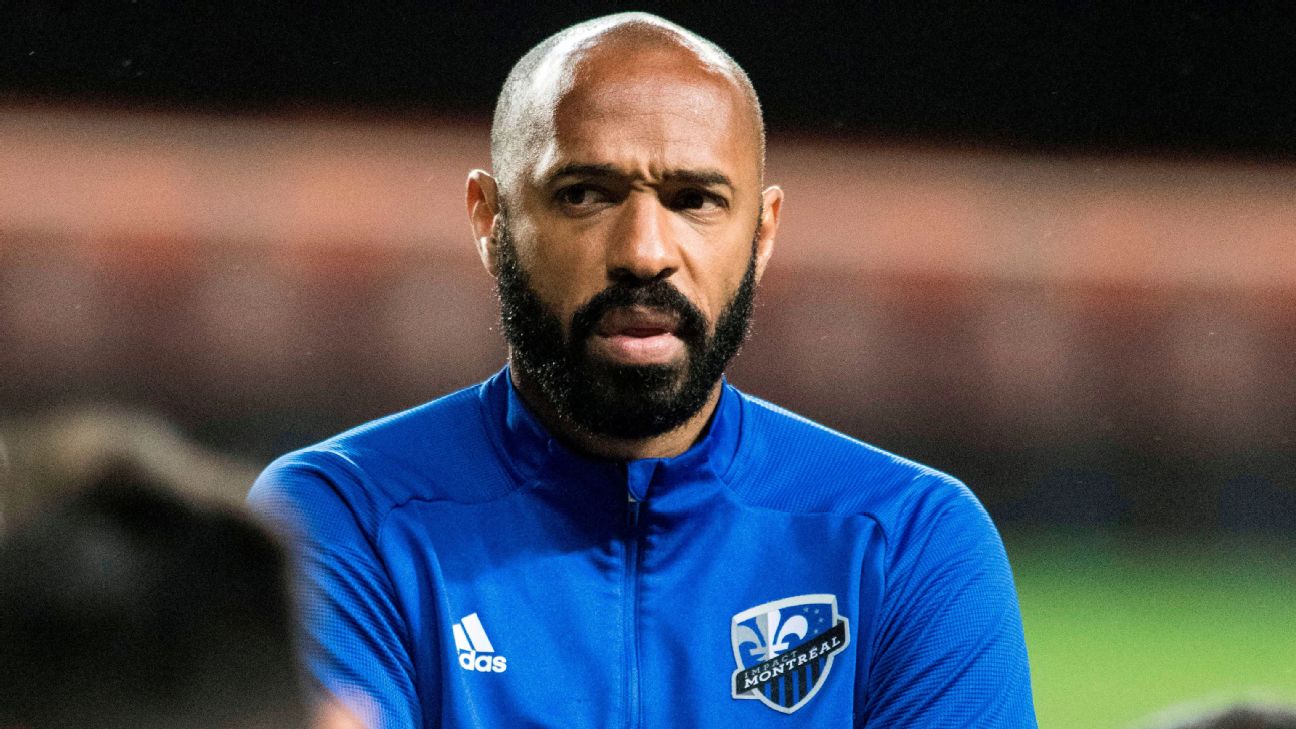Products You May Like
ORLANDO, Florida — Thierry Henry is annoyed. He grimaces. He extends his hands for emphasis, palms to the sky. It is a look the world has seen before.
Since the start of a 20-year playing career that included spells at some of the world’s most important football clubs, Henry has held his teammates, the journalists who covered him, and even his managers to the highest standards. He’s been quick to express frustration with anyone who wasn’t good enough, didn’t try hard enough or, once, who didn’t push in his chair after a press conference.
Whether he responded with a word or a gesture, it was never hard to tell what he was thinking. He packed an entire narrative into a turn of the hands, a roll of the eyes. “He could score an amazing goal,” says Dennis Bergkamp, who played alongside Henry at Arsenal, “and then a moment later he’d be angry with someone for not passing the ball correctly. That’s the way he was.”
On this January morning, Henry is sitting in the lobby of a generic resort outside Orlando. Soon he’ll be taking his team out for training during a preseason camp. But at the moment, the new coach of the Montreal Impact is gaining momentum in his rant against the elimination brackets that North America’s major sports leagues use to decide their champions. He finds them absurd.
MLS 2020 coverage:
– Power Rankings: LAFC on top, Seattle plummeting
– Carlisle: Zimmerman laying down roots in Nashville
– Experience MLS like a die-hard fan
– Stream MLS games LIVE on ESPN+ (U.S. only)
“You can win 33 out of 38 games, and then you meet a team that’s on a little run, and you lose,” he says, his voice rising. “And that’s it. One game and you’re out.”
He spits out the word he despises as much as any other: “It’s random.”
Henry experienced exactly that disappointment with the New York Red Bulls, where he spent the last four-and-a-half seasons of his career. In 2013, the Red Bulls amassed the best regular-season record in MLS. Then they immediately lost their home-and-home conference semifinal to bottom-seed Houston. It wasn’t fair, but it was the system. “Those are the rules,” he says.
So too is the structure that allows teams to sleepwalk through the regular season and flip a switch when the playoffs start. Or worse, lose every game and show up the next year ready to play again, rather than getting relegated as in nearly every other league in the world. “What happens if you lose?” he asks. “Nothing! Nothing happens. You’re still in MLS, or the NBA, or NFL, or whatever. The rules allow you to just let it go. You shouldn’t let anything go. In Europe, it’s unacceptable. It would never happen. It shouldn’t happen.”
He sighs. “But you have to know where you are,” he says.
A little more than a year ago, Henry was in Monaco, ending a managerial stint that was as short — three months — as it was disappointing. He’s back in MLS now, trying to rehabilitate his reputation while managing with a distinctly different frame of reference. Henry won nearly everything a player can win, but the Impact have been the model of a mediocre franchise, with only three trips to the playoffs in eight MLS seasons, and seven head coaches during that time.
Henry’s task is clear. If he can do a credible job for a couple of years, he’ll put distance between Monaco and his next job. “It could take him back on the managerial ladder in Europe,” says Craig Burley, the former Scotland international and current ESPN commentator.
It seems simple enough. But can Henry accomplish that without getting too annoyed?
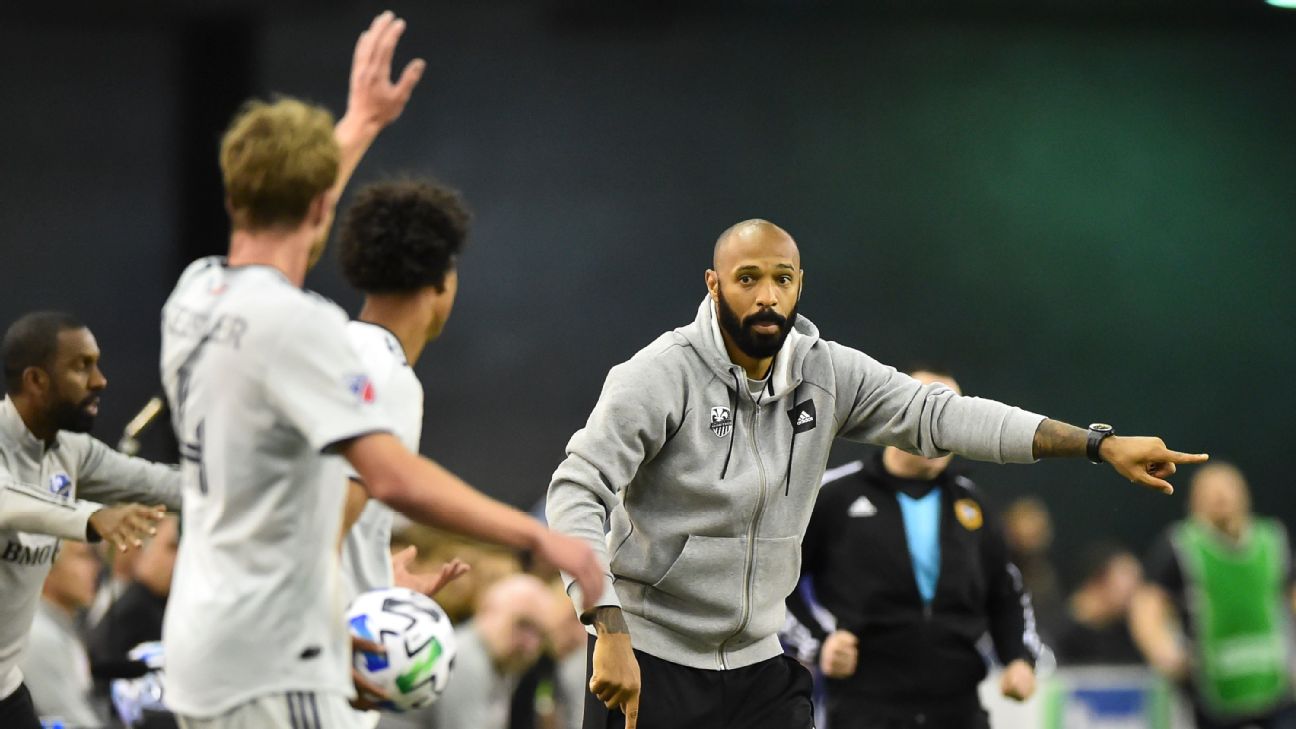
HENRY WAS HOME IN LONDON LAST NOVEMBER when Impact president Kevin Gilmore called to discuss becoming the club’s next head coach. On the face of it, the idea of him returning to MLS seemed surprising. He’d been an exemplary player with the Red Bulls, but he frequently exuded the air of someone who was accustomed to better teammates. “That’s because he was,” says Dax McCarty, now with Nashville SC, who was on that Red Bulls team.
Henry played at Barcelona with Lionel Messi and Andres Iniesta and Xavi. He played at Arsenal with Dennis Bergkamp and Freddie Ljungberg. He played, albeit briefly, with Alessandro Del Piero at Juventus, and on that exquisite 1998 French World Cup team with Zinedine Zidane, Patrick Vieira, Marcel Desailly and Didier Deschamps. He’d even occasionally speak sharply to them if they weren’t up to standard.
In New York, he had Rooney behind him — but it was John Rooney, Wayne’s brother, who’d come from Macclesfield Town. Instead of Frank Rijkaard or Ashley Cole at the back, there was Teddy Schneider, who’d hustled through four years at Princeton. Jonny Steele, who had put in time with the Syracuse Salty Dogs, the Puerto Rico Islanders and Ballymena United, roamed the midfield. “You’re around players who can’t find you when you need to be found,” says Lloyd Sam, who also played on that Red Bulls team, and before that at Leeds and several other English clubs. “He had a standard. He would always ask me, ‘Lloyd, was that high level?'”
But time can alter perspectives. So too can a horrendous first managerial experience. One of France’s richest clubs, Monaco had advanced all the way to the Champions League semifinal in 2017. Henry arrived in October 2018. He was gone by the following January after winning just two of 12 league games, and four of 19 overall. The disaster didn’t go unnoticed. “Not a lot of people called me after that,” Henry admits.
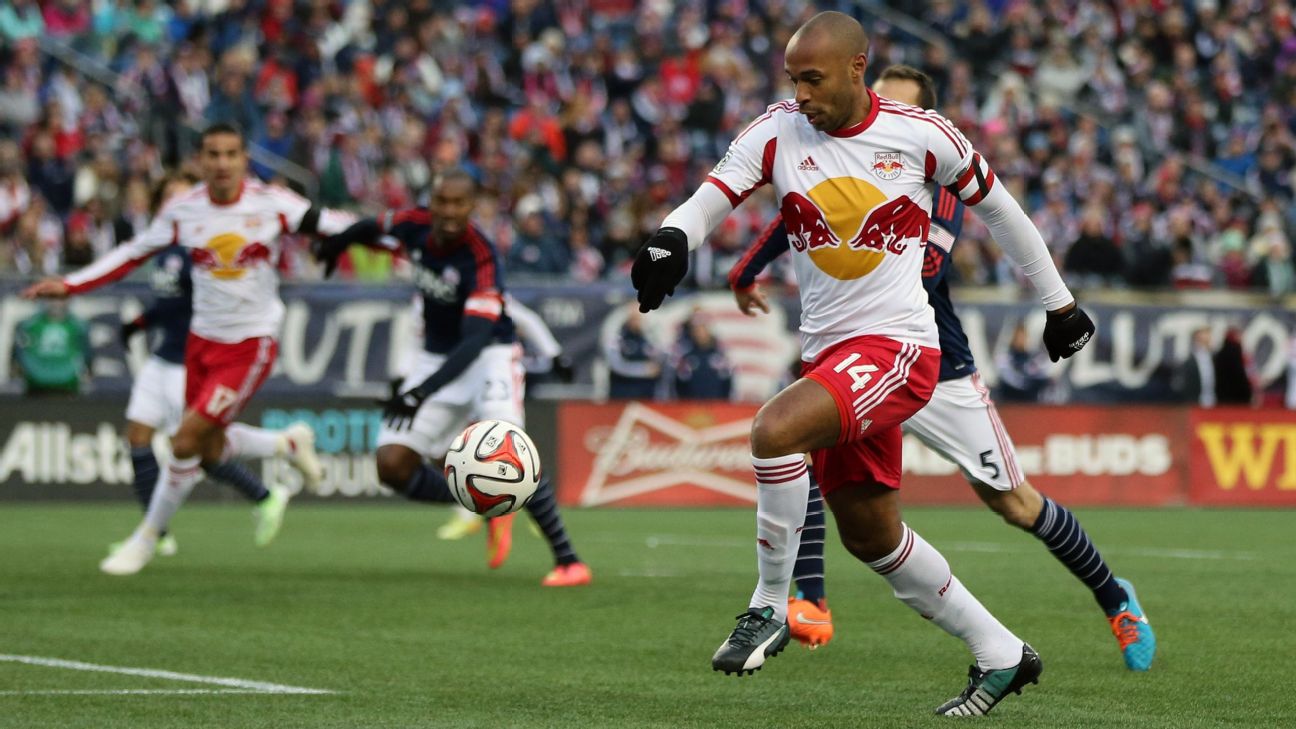
Henry — so uncompromising, so articulate — still appeared to be someone who would make a good manager. But which club wanted to take the chance? The Montreal Impact, it turned out. “When somebody does call, you have to take the call,” Henry says. “Montreal came my way, so I assessed the situation. First and foremost, it was a football decision.”
Meaning: it was a job. It didn’t hurt, though, that the city itself — French-speaking, sophisticated, architecturally distinctive — reminded him of the Paris where he grew up or the London where he has chosen to settle. “The culture,” he says. “The restaurants. The diversity. The look. The way of life.”
For the Impact, Henry was a famous name who would inject interest in a team that hasn’t even made the MLS playoffs in the last three seasons. “Obviously from a marketing position, Thierry makes a whole bunch of sense,” says Gilmore, who reportedly didn’t interview any other candidates. Other than the entire roster of the NHL’s Canadiens, Henry instantly becomes the best-known sports figure in town. “And he can speak French,” adds Olivier Renard, the sporting director. “That’s very important in Montreal. In MLS, it’s not so easy to find.”
But Henry made one thing clear: Despite what had happened in Monaco, he was determined to coach the Impact the way he would have done it in Europe. “Every game should matter,” he says now. “I have a clear view of that. A clear view of what I want to do. A clear view of how our team should play. I need time to implement it, but I won’t change it no matter what is happening.
“Because,” he added ominously, “it is important that you die with your convictions.”
OF THE STANDOUT FOOTBALLERS OF HENRY’S GENERATION, the 47-year-old Zidane has set an impossible standard for managerial success at Real Madrid. Nobody else, it is safe to say, will win the Champions League in his first year of running a senior club, and then win it the next year and the year after that.
Who’s second? Maybe Patrick Vieira, another Frenchman, who at 43 is a year older than Henry. He won 40 and lost 28 (with 22 draws) as the manager of NYCFC. These days, he’s winning more than he’s losing at Ligue 1’s OGC Nice, not exactly a traditional powerhouse. Or else the Netherlands’ Giovanni von Bronckhorst, 45, who won two Cups and an Eredivisie at Feyenoord. (He’s coaching in China, but is almost certain to be back in Europe eventually.)
Frank Lampard, 41, did so well in his first season at Derby County last season that he was hired to manage Chelsea, stepping into shoes previously worn by Jose Mourinho and Carlo Ancelotti. David Beckham and Ronaldo, both slightly older than Henry, might have managed, but they’ve chosen to become owners instead.
Then there’s Henry. He retired in 2014 and announced his intention to manage, preferably at Arsenal. “A dream come true,” he said, aspirationally. He understood that he needed credentials, so he began working in Arsenal’s youth program. When Roberto Martinez was hired to run the Belgian national team in 2016, Henry jumped on as the second assistant, which essentially meant coaching the forwards.
By all accounts, Henry was a helpful presence for Belgium. He had no problem telling important players with large personalities, such as Eden Hazard and Romelu Lukaku, exactly what he thought, and he had enough credibility that they wanted to hear it. Unlike Martinez, though, he didn’t sign up for another four years after Belgium finished third at the World Cup. “He wanted to be a head coach,” says Bergkamp.
That October, Monaco suddenly fired Leonardo Jardim and hired Henry, who had started his senior career there a quarter-century before. “He knew the club,” Bergkamp says. “He knew exactly what it meant to be there.”
During that career, Henry had the good fortune to play under some of the world’s finest managers. Put Pep Guardiola at the top of that list, but add Ancelotti, Wenger, Aime Jacquet and the underrated Jean Tigana.
“Arsene was a coach who triggered my brain on a lot of subjects,” Henry says. “Pep triggered my brain tactically. Tigana taught me how to handle a young player.” He only played for Ancelotti briefly, “but he was a players’ manager.” And from Jacquet, he learned to be stubborn. “He had a vision,” Henry says. “No matter what, nobody was going to make him change.”
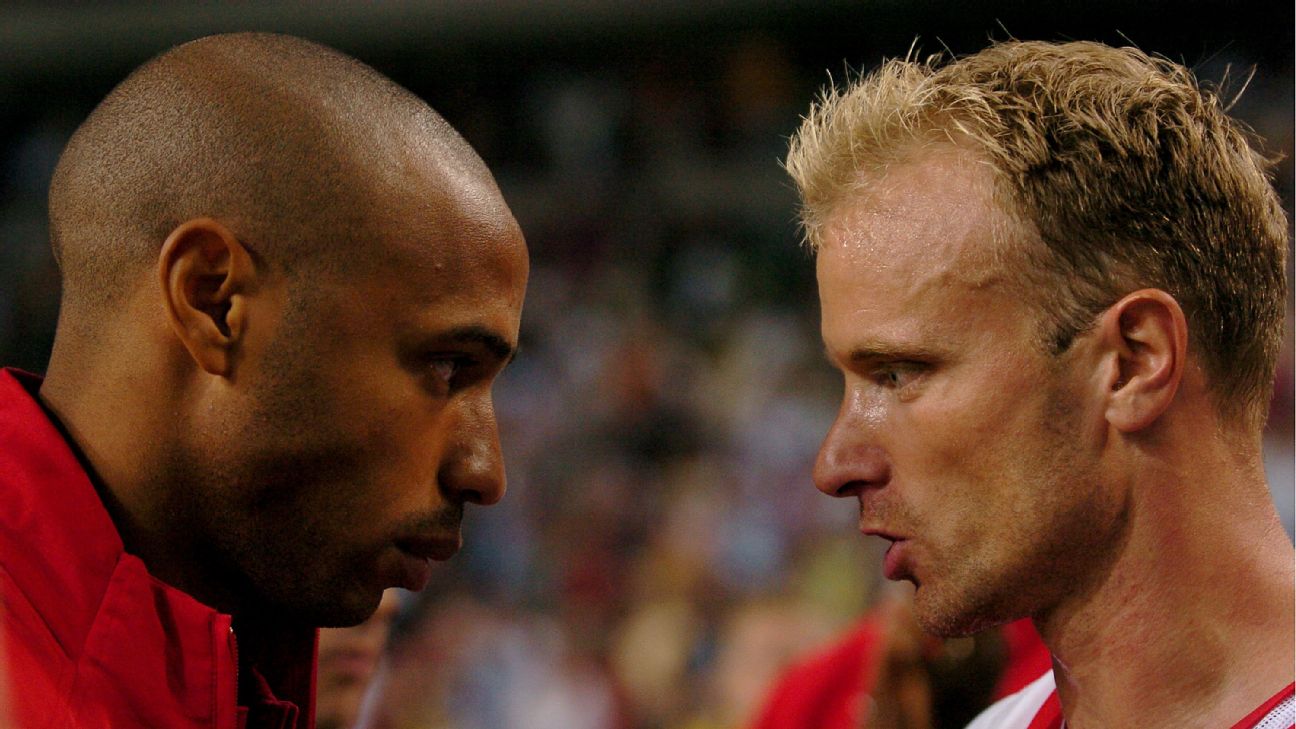
Henry saw the style he was creating as a mélange of them all. “You learn from everybody, you take a bit from everybody, you make it your own.” He showed up at Monaco perfectly organized, all file cards and training plans. “You could tell that he had learned a lot from very good coaches,” says Benny Heinrichs, the Monaco defender. Heinrichs could sense the wheels spinning. “We knew exactly what we had to do at all times,” he says. “He gave us a high level of tactics for every game. And our training sessions were always very intense. But we had a lot of injuries, and a lot of young players. It was a difficult situation.”
In the spring of 2017, Monaco capped a four-year run since promotion with its first Ligue 1 title since 2000 and reached the Champions League semifinal. A little more than a year later, expectations remained high. The team was coming off a second-place finish behind Paris Saint-Germain. It was playing in the Champions League again. But of that 2016-17 team, Kylian Mbappe, Bernardo Silva, Fabinho, Thomas Lemar and Benjamin Mendy were all gone by the time Henry arrived. Mbappe was sold to PSG for a fee of nearly $200 million.
That could pay for a lot of art for owner Dmitry Rybolovlev’s collection, which already included Picasso, Gauguin, Matisse, Rodin and Modigliani. What it didn’t do was buy players to take the place of those who had moved on. After injuries decimated the squad, Henry became impatient, perhaps with good cause. Only he seemed to know how little time he actually had.
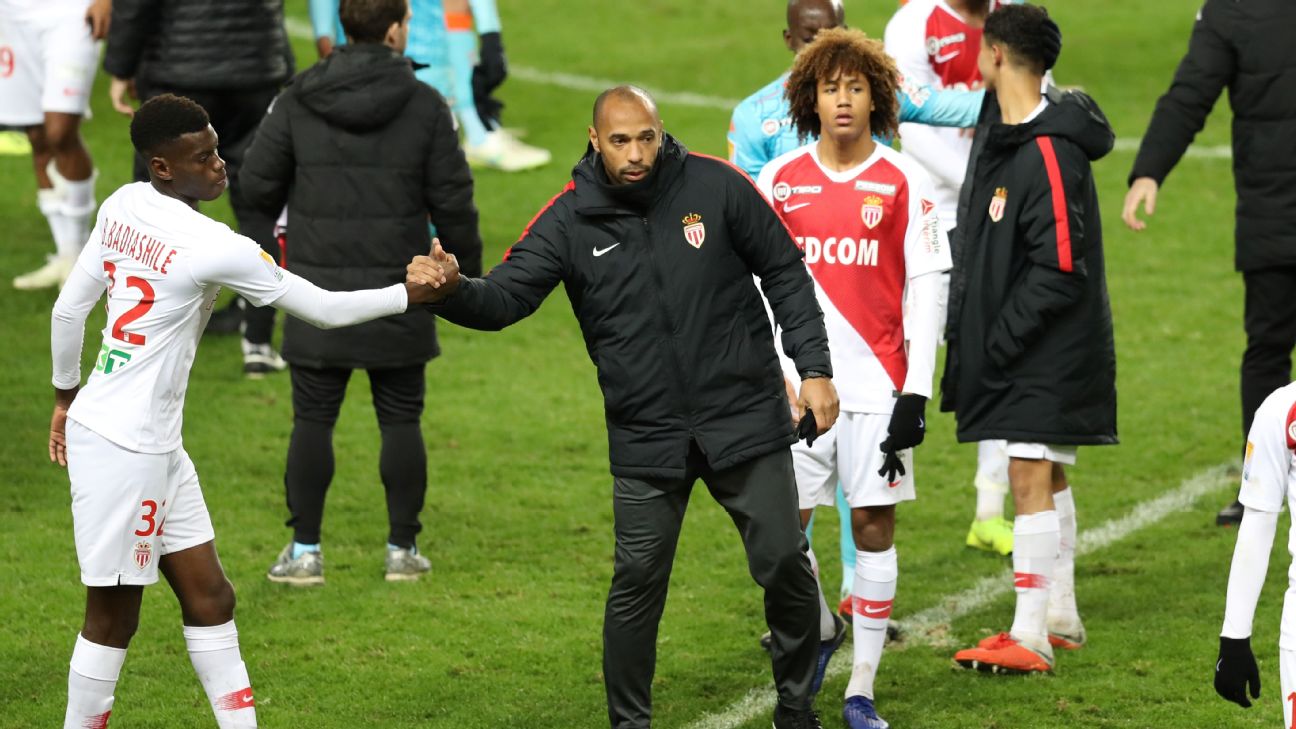
Henry used players out of position. He abandoned all pretense of attacking and concentrated on keeping possession. And he became increasingly irritable. “Your grandmother’s a whore,” he told Strasbourg leftback Kenny Lala, who must have wondered where the erudite football legend he’d grown up worshipping had gone. At the same time, Rybolovlev had become part of the investigation in a celebrated fraud case involving a Swiss dealer, called the Bouvier Affair. The owner wasn’t accused of doing anything wrong, but it added to the general air of distraction.
When reinforcements finally came in the form of Cesc Fabregas and a few others in the January 2019 transfer window, they were too little, too late. After a loss knocked Monaco out of the French cup, Henry threatened to demote several first teamers to the reserves. They complained to management, which figured either Henry or half the team had to go.
It wasn’t a difficult choice.
“We were surprised because we’d had a good, hard training the day before,” said Heinrichs. “But we also weren’t surprised, because the results were not good.” Henry moved on with class and distinction. He thanked Monaco for the opportunity. He agreed that his results had been unsatisfactory. He didn’t complain — not publicly, at least. “I learned a lot,” he says now. “I always say, either you win or you learn.”
He also left behind a cadre of players who felt that he was just starting to make a difference. “You know, it was his first club,” says Heinrichs. “I think he expected something completely different. Give him some time and a good team, and I think he’ll show that he can be very good. Tell him to come back to Europe. I’d love to play for him again.”
Nevertheless, Heinrichs (and most everyone else) played better for Jardim, who was rehired to replace Henry. Monaco was facing relegation, second from the bottom of the league, when Henry was fired. The club climbed out of the relegation zone and stayed in Ligue 1. Under Jardim this season, the club sits mid-table. Sometimes supporters must wonder if Henry really managed there at all. Or were those three months just a bad dream?
IT SEEMED ODD, even to the members of the Impact’s traveling part, but when you walk around the back of that resort in Orlando, past the swimming pool and the golf course, you come across two full-sized football pitches. The next morning, Henry is standing on one of them, a target man holding off a defender.
In real life, the defender is a striker, Anthony Jackson-Hamel. Henry’s arms are spread wide. He’s moving his feet just enough to keep Jackson-Hamel off-balance, on his heels, leaning backward. For half a minute, the 43-year-old Henry maintains his position against someone who is almost exactly the same size, but a decade-and-a-half younger. He could have done it for five minutes, you get the feeling, but the point was made.
Henry the manager is an active coach. At Monaco, he’d stand in the middle of the box with the ball and challenge the club’s young defenders to get it away from him. “They couldn’t, of course,” Heinrichs says. Now he’s teaching his techniques to his strikers, hoping to improve on an attack that didn’t include any of the league’s Top 30 scorers — or anyone who even managed to reach double figures in goals — and a minus-13 differential that left the Impact languishing in ninth place in the Eastern Conference. (Under Henry, this year’s team has started better: a win at home against New England and a draw at Dallas.)
The Impact have no real history of achievement. They haven’t had a winning record since 2016. (And even then, it was only 15-13-6.) Some fairly big names passed through as head coach — the American Jesse Marsch, who is now at Red Bull Salzburg; Remi Garde, who managed Lyon and Aston Villa — but nobody lasted long enough to make a genuine imprint. “We’ve been a club without a real identity or philosophy,” says Gilmore.
That’s a standard Henry is sure he can meet. If nothing else, he promises, the world will see his influence. His team will run and press. It will thrive on intensity and work ethic. “Those are principles, not strategies,” he says. “They don’t change.” As for competitive success, well, the bar is low. “The pressure here is not like the pressure at Monaco,” Renard says. “We are trying to build something. We want to take the approach that we want, and we will not change that after two or three months, regardless of how many games we win.”
Henry understands that. At least, he gets it intellectually. Ask him if the Impact will make the playoffs and he’ll brush away the question with a wave of the hand. “You have teams that are successful in different ways,” he says. This sets him off on another harangue.
When he walks the streets of North American cities, it saddens him to only ever see fans wearing shirts of the biggest clubs, the ones that win all the time: Real Madrid and Manchester City, Barcelona and Juventus. “It is very easy to wear those shirts,” he lectures. “What shows true understanding of the game is to wear a Southampton shirt. If I saw that, then I would be impressed.” He mentions Sean Dyche at Burnley and Eddie Howe at Bournemouth. “Some people would say, ‘They didn’t win anything!'” He wags a finger. “No! It is success in a different way.”
If one of the young players at Monaco goes on to make a national team, if he learned something under Henry’s tutelage that raised the level of his game, well, isn’t that also a credit to him? “It’s ‘You changed the life of that guy,'” he says. It’s a sensible way to think.
But wait. This is Thierry Henry. He won La Liga and the Premier League, Ligue 1 and the MLS Supporters’ Shield. He won the FA Cup and the Copa del Rey. He won the Champions League and the UEFA Super Cup and the Euros. He won the World Cup. “Thierry is a winner,” Bergkamp says. “He just wants to win, win, win. And that’s very demanding for everyone around him.” Bergkamp says he thrived as Henry’s teammate because he felt the same way. “But not everyone did,” he says. “If it gets to be too much for them, it could be a problem.”
As a player, Henry could often control his own destiny. “He would literally carry the team sometimes,” Sam says. “And that’s what I worry about for him now. When you’re a manager, your control ends when the team crosses the line. He can’t just go score a goal from the corner on his own when his team needs one. He’s going to have to count on his players.”
And as he probably has noticed, there isn’t a Thierry Henry among them.
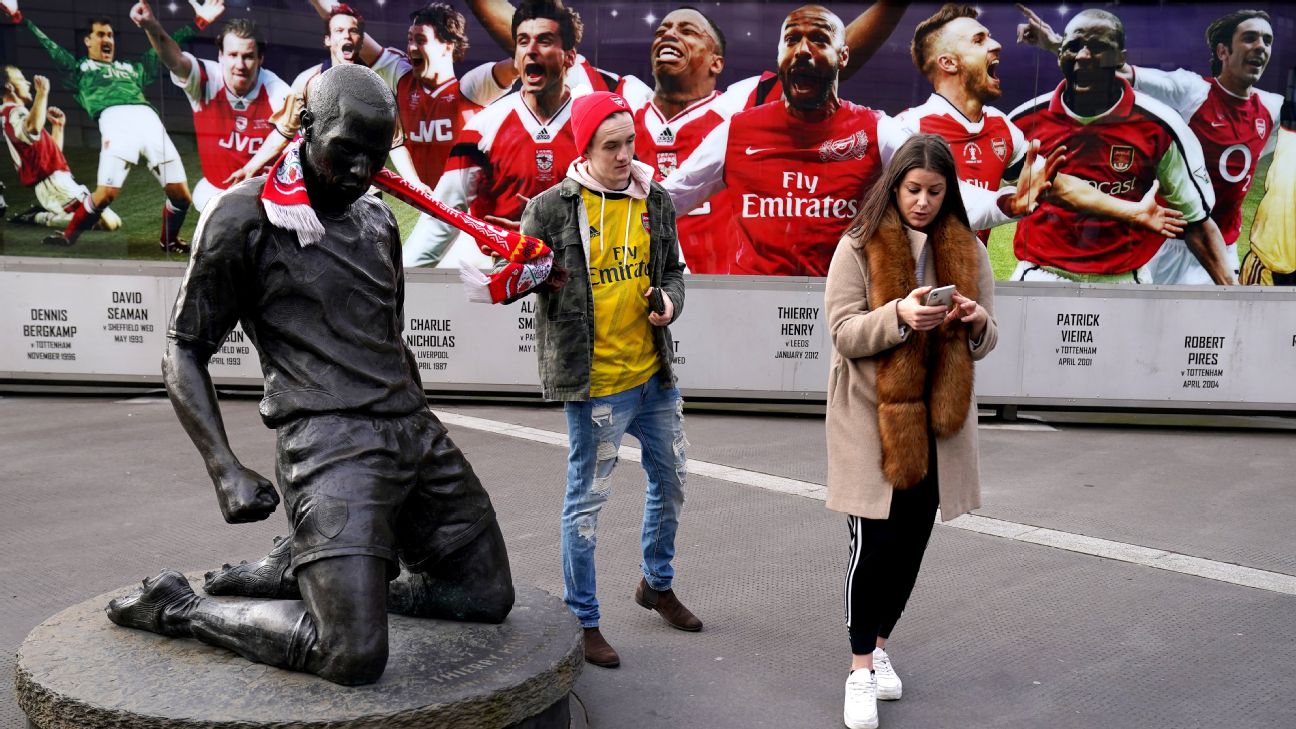
BY DEFINITION, FRIENDLIES ARE FRIENDLY. They aren’t supposed to matter. Still, after winning the first one with Henry as their manager, the Impact didn’t even score a goal in the next four. They lost them all. Then they went to Costa Rica and blew a 2-0 lead to Saprissa in the first leg of the CONCACAF Champions League last-16.
The ramifications? You’d hope they were nonexistent. What kind of coaching job would Henry have accepted if a few friendlies and a draw in unfriendly territory far from home would make a difference?
Nevertheless, wounds heal slowly. A man’s nature is his nature. And in Joey Saputo, the Impact has an impatient owner whose inclination has been to change head coaches first and ask questions later. That’s a dangerous situation for Henry, who can’t afford to be fired again anytime soon. “If things don’t go well,” Burley says, “it’s difficult to see him picking up the pieces somewhere else.”
Such knowledge concentrates the mind. Returning to Montreal for the second leg of the CONCACAF series, which would be followed in quick succession by the MLS season-opener with New England, a game the Impact would end up winning, Henry cancelled all his press appearances.
The return leg against Saprissa was in doubt. Not the result, but the game actually happening. A snowstorm was forecast for the evening of the game, which was being played in Montreal’s cavernous Stade Olympique. One of that venue’s unique features is that the roof rips easily: 7,453 times between 2007 and 2017, according to the Canadian Broadcasting Corporation. The facility becomes legally unsafe with more than three inches of snow on it.
In the end, the game was played. The scoreless slog probably didn’t win any converts to Henry-ball, but it did advance the Impact to the next round. A few minutes after the match, Henry arrived to face the media. He fielded questions in French, English and Spanish with impressive facility. (He could have handled Italian and Catalan too, if that had become necessary.) Someone asked if he was surprised that, needing away goals to advance, Saprissa didn’t show more inclination to attack. Henry’s lips seemed to quiver. He spoke slowly. “There was a tactic on the other side to make sure they couldn’t enter,” he said.
Then someone else asked if it was difficult to play such an important match, an elimination match, coming straight out of friendlies, before the MLS season had even begun. It was a question that showed empathy for Henry’s predicament. But as a representative of the sport itself, the self-designated guardian of its sanctity, he took umbrage at the concept. He shifted forward in his seat.
“That’s the story of football,” he said. “You have to have results. All the time! It doesn’t matter where you are.” He motioned for the next question with the tiniest shake of the head, just enough to be noticed. Even some of the journalists who were still just getting to know him had to smile. All was right with the football world. Thierry Henry was annoyed.
